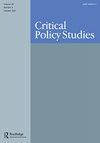Assembling good citizenship under Korean COVID-19 surveillance
IF 2.4
3区 社会学
Q1 Social Sciences
引用次数: 4
Abstract
ABSTRACT The Korean COVID-19 surveillance system generates public discourses on good citizenship regarding civic duty, human rights, and social equality by releasing the travel history information of COVID-19 patients to the public. Through digital ethnography, this article examines how good citizenship is constructed in three material contexts – things, places, and mobility – associated with COVID-19 patients’ movements. From the new materialist perspective, citizenship is an outcome of the socio-material assemblage of things, people, and institutions. We view travel history information as ‘actants’ that affect people’s behaviors, especially, mom cafés mothers’ conception of good citizenship. This citizenship involves materiality related to face masks and COVID-19, a sense of place in terms of crowded places, and the physical mobility of COVID-19 patients. The disclosure policy on travel history information plays a vital role in overweighing civic duty over human rights and social equality by decontextualizing the life of COVID-19 patients due to concerns over privacy infringement. This policy spawns a uniform citizenship that overlooks the economic and cultural differences among COVID-19 patients. Ultimately, irregular employees, sexual minorities, and delivery workers carry a greater burden in complying with the civic duties of the general population.在韩国新冠肺炎监测下聚集良好公民身份
韩国的COVID-19监测系统通过向公众公布COVID-19患者的旅行历史信息,产生关于公民义务、人权、社会平等的良好公民话语。通过数字民族志,本文探讨了如何在与COVID-19患者运动相关的三种物质背景(事物、地点和流动性)中构建良好的公民身份。从新唯物主义的角度来看,公民身份是事物、人和制度的社会-物质组合的结果。我们认为旅行历史信息是影响人们行为的“因素”,尤其是影响母亲对好公民观念的因素。这种公民身份涉及与口罩和COVID-19相关的物质性,在拥挤的地方有一种地方感,以及COVID-19患者的身体流动性。旅行记录信息公开制度是在担心侵犯隐私的情况下,将新冠肺炎患者的生活脱离情境,在超越人权和社会平等的公民义务方面发挥了重要作用。这种政策形成了无视经济、文化差异的统一公民权。最终,非正规雇员、性少数群体和快递员在遵守普通民众的公民义务方面承担着更大的负担。
本文章由计算机程序翻译,如有差异,请以英文原文为准。
求助全文
约1分钟内获得全文
求助全文

 求助内容:
求助内容: 应助结果提醒方式:
应助结果提醒方式:


